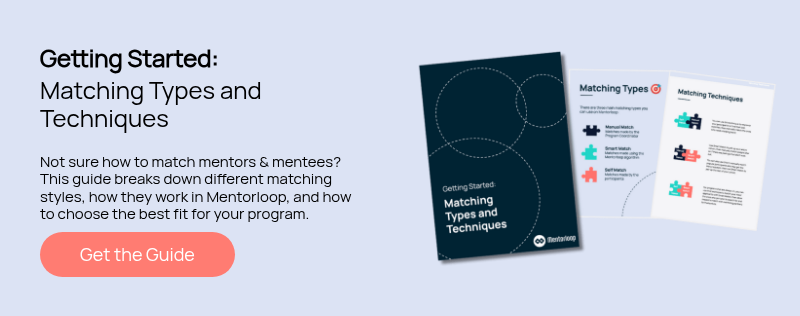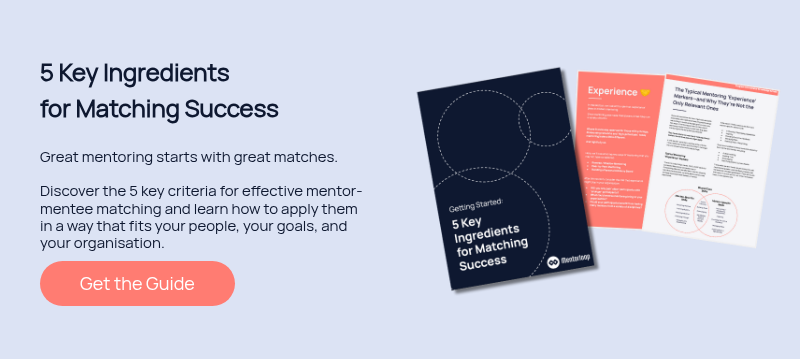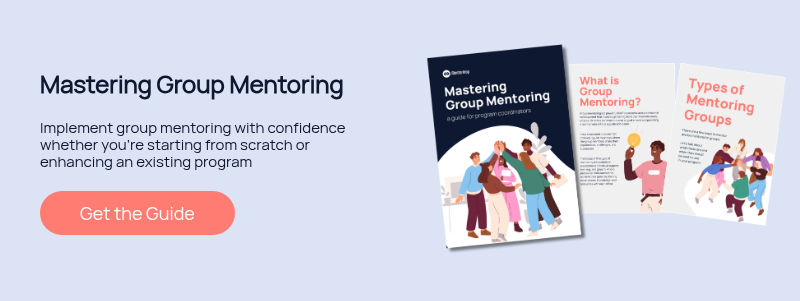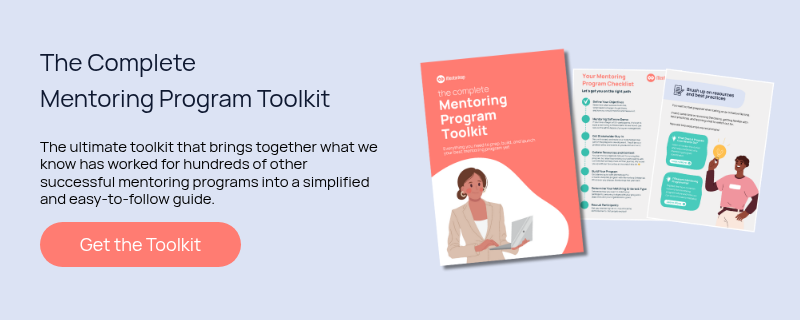Mentoring programs can play a pivotal role in the personal and professional development of individuals, teams, and organizations. The benefits of formalised mentorship are well appreciated, with evangelists spanning across the entire professional spectrum. However, many organisational mentoring programs are often poorly designed, poorly run, and poorly executed. And unfortunately, this kills most of the potential gains an organisation and participants can garner from a formalised mentoring program. And while mentoring is very much a “some is always better than none” proposition, there are ways you can ensure that your mentoring program is on the right track.
So, what makes a good mentorship program? In this article, we outline five key features that set great mentoring programs apart from the rest. We’ll also provide insights and tips on how organizations can create great mentoring programs.
Let’s get to it!
A successful mentorship program features great matching
The heart and soul of every mentorship program are the matches made within it. It’s why many mentoring program coordinators worry about the matching process. Here are ways you can increase your chances of making good matches within your program.
Choose the right matching type and technique
The right type of matching will depend on the goals and objectives of your program. It pays to think about whether your program’s objectives will benefit from manual matching, self-matching, or algorithmic matching.
Clarify goals and expectations
Before matching mentors and mentees, be sure to clarify the goals and expectations of the mentorship program. This will help you identify the specific skills, experience, and personality traits that are necessary for a successful match.
Use a matching survey
Use a matching survey to gather information about both mentors and mentees. The survey should ask questions about their background, experience, interests, and goals. This information can then be used to match mentors and mentees who have similar goals, interests, and backgrounds.
Pro Tip: If you’re running your program on Mentorloop, there’s no need to do this beforehand. As your participants sign up, Mentorloop guides them through completing a profile that helps you, your participants, or the algorithm decide on who would be great mentoring pairs.
Provide training and support
Provide training and support to both mentors and mentees to help them develop the skills and knowledge necessary for a successful mentoring relationship. This can include training in communication, goal-setting, and leadership development.
On Mentorloop, you can easily provide this kind of support through Recommended Reading. You can select different content for mentors, mentees, and even those who have chosen to be both in your program. You can also change the content you suggest to your participants as often as you think is necessary, ensuring that they’re always learning something new or able to reinforce good practices in their mentoring relationships.
Monitor and adjust matches
Regularly monitor the progress of mentoring relationships and adjust matches as necessary. Most good relationships in life require a little bit of chemistry, and mentor relationships are no different. Mentoring software does a great job of matching people based on interests, experience, and desires, but even that cannot account for the secret sauce. If there are matches that don’t work out, it’s important that there are processes in place for the program coordinator to find out early, determine what the issues are, and then remedy the situation accordingly – whether that be via mediation or rematching.
A successful mentorship program features diversity and inclusion
At Mentorloop, we believe that mentoring should be accessible to everyone. However, many mentoring opportunities are often reserved for exclusive groups like high achievers. While these groups can definitely benefit from mentoring, there is a huge majority of individuals who are wrongly omitted, to the detriment of your entire cohort and organisation.
A great mentoring program ensures that all members of the organization, regardless of their background, role, or level of experience, have access to valuable and relevant mentoring opportunities. All individuals can benefit from support, advice, and ongoing development – and all organisations can benefit from a more interconnected workplace.
Here are a few tips for fostering diversity and inclusion in your mentoring program.
Recruiting diverse mentoring program participants
It goes without saying that mentoring programs be open to all. But great mentoring programs go a step further – they conduct some intentional recruitment among underrepresented groups within the organisation.
It also pays to remember that a diverse program isn’t just one that has participants from different cultural backgrounds. It also means including mentors and mentees from different departments, levels of seniority, lived experience, etc. All of these layers to your participants’ profiles bring more richness and added value for everyone involved in the program.
Recruiting participants from different departments, levels of seniority, and cultural backgrounds means your entire cohort can benefit from a wide range of perspectives and experiences, which can help everyone grow both professionally and personally. And that can only ensure success for your mentoring program.
Remove bias from matching
The benefits of having a diverse group of mentors and mentees are dampened if participants are matched with partners who are very similar to them anyway.
To avoid this, your matching should be based on factors unrelated to your participants’ demographic profile. Instead, consider matching based on factors such as career goals, areas of specialisation, interests, and personality traits. By doing so, mentees can be paired with mentors who are best suited to help them achieve their goals and overcome any challenges they may face, as well as increase the chances that they hit it off as their pairing isn’t based on shallow similarities.
Remove bias with Smart Match
Mentorloop’s Smart Match allows you to match your participants using criteria relevant to your program goals. It also enables you, the program coordinator, to make matches using predetermined criteria in minutes, saving you time and effort.
Provide opportunities for group networking and networking
This can be done through events such as workshops, seminars, and networking sessions. By bringing together mentors and mentees from different backgrounds and departments, organizations can create a supportive community where everyone can learn and grow together.
These activities can also be opportunities for more than just normal networking. Your mentees can meet other peers and mentors and start building their Personal Advisory Boards, mentors can learn things from other mentors that can help them in their existing mentoring relationships, and everyone can benefit from the wide variety of perspectives that your diverse cohort brings.
Even better, you can provide opportunities for group mentoring within your program. With Mentorloop, you can organize Group Loops to connect peers, employee resource groups (ERGs), or people with shared interests—giving them the chance to learn from and with each other. This is where diversity of perspectives really shines: participants gain exposure to new ways of thinking, broaden their understanding of challenges and opportunities, and leave with richer, more inclusive insights than they could have developed alone.
Have clear guidelines and expectations
All people initiatives should have these, to begin with, but these are vital for mentoring programs invested in inclusivity. Guidelines on confidentiality, communication, and feedback should be made clear from the very beginning. Underrepresented and minority groups can often feel uneasy about forming these close professional relationships. Having these clear guidelines can give them reassurance.
By ensuring guidelines and expectations are clear and making sure everyone is aware of them, all the participants involved in the program can feel safe and supported, which can help foster a culture of trust and respect.
Find out how the US Tennis Association built and runs their successful DEI (Diversity Equity and Inclusion) program
An inclusive mentoring program is essential for creating a supportive and empowering environment for learning and growth. By embracing diversity, implementing targeted strategies, and providing opportunities for group mentoring and networking, organizations can foster a culture of inclusiveness that benefits everyone involved.
A successful mentorship program features the participants' needs at its core
Many modern mentoring programs are ROI and tracking-focused. And while these should definitely be a consideration and is great for HR and the C-suite, it fails to address the actual program participants. Mentors and mentees are the target beneficiaries of mentoring programs, and yet they often understand less about mentoring than the program coordinator and often receive far less support and attention.
Program coordinators for great mentoring programs understand that for the initiative to work, the participants need to come first. Here’s how you can ensure that the needs of your mentors and mentees are at the core of your program.
Encourage consistent and purposeful communication
The success of a mentoring relationship requires a lot of effort and dedication from both parties involved. Mentors should be willing to share their knowledge, expertise, and experience with their mentees. They should also be open to learning from their mentees, as the relationship should be a two-way street.
Mentees, on the other hand, should be proactive in seeking guidance and feedback from their mentors. They should be willing to take risks and step out of their comfort zones to grow and develop. Mentees should also be respectful of their mentors’ time and efforts, and show gratitude for their support.
Both mentors and mentees should be open and honest with each other about their goals, expectations, and challenges. They should also be willing to give and receive feedback in a constructive and respectful manner.
And while these are all up to the participants, that doesn’t mean you can’t influence them. You can encourage this behaviour by setting expectations from the beginning, then offering support and guidance throughout their mentoring journey.
Inform your mentors and mentees about what is expected when they join. That way, you give participants a clear understanding of what they need to do and what their mentoring partner will expect. It also gives people the option to opt out of joining if they don’t have the capacity for this kind of commitment at the moment.
As your participants start their mentoring journeys, make sure you provide them with the necessary guidance on how to be great mentors and mentees, as well as tools to help them navigate their first meetings with their mentoring partners.
It’s also important to keep reinforcing the behaviours that allow for good mentoring to take place as the program progresses. You can do this by providing supportive resources for your mentors and mentees as they progress in their mentoring journeys. Sharing useful content on things like active listening and goal-setting also encourages participants to keep communicating with their mentoring partners and working with them to make progress on their goals.
Encourage accountability
Part of making sure that your mentorship program has your participants’ needs at its core is by encouraging accountability. Mentors and mentees should hold each other accountable for their actions and progress. Here are a few ways you can encourage this.
- Set clear expectations: At the beginning of the mentoring relationship, establish clear expectations for both the mentor and mentee. This can include goals, timelines, and communication expectations.
- Establish regular check-ins: Schedule regular check-ins to review progress and discuss any issues or challenges. These can be in-person meetings, phone calls, or video chats.
- Provide training and resources: Provide training and resources to both mentors and mentees to help them understand their roles and responsibilities in the mentoring relationship.
- Foster a culture of feedback: Encourage both mentors and mentees to provide feedback to each other regularly. This can help identify areas for improvement and keep both parties accountable.
- Celebrate successes: Celebrate your participants when they achieve their goals! This can help keep both mentors and mentees motivated and accountable to continue working towards their goals.
- Hold mentees accountable: While the mentor is responsible for providing guidance and support, it’s important to hold mentees accountable for their own growth and development. Encourage mentees to take ownership of their progress and provide opportunities for them to demonstrate their skills and knowledge.
If you’re running your program on Mentorloop, you don’t need to spend a lot of time managing your participants’ momentum and making sure they’re holding each other accountable in this way. Mentorloop does all of this for you through participant Milestones, sending them contextual Nudges and making Recommended Reading easily accessible, and asking participants for feedback at key points in their mentoring journey.
Learn more about momentum management on Mentorloop
Ultimately, a great mentorship program should empower both mentors and mentees to reach their full potential. By prioritizing the unique needs and experiences of both parties, a mentor-mentee-oriented program can create a supportive and transformative environment for growth and development.
A successful mentorship program is action-oriented
It’s important for a mentorship program to emphasize practical, actionable goals and to encourage the translation of insights into real-world decision-making. Mentoring is not a passive endeavour. It should feature goal-setting, task assigning, and event attendance. And these tasks should be ongoing and active. A great mentorship program does not just provide support and guidance. It motivates mentees to take responsibility for their own development and empowers them to drive meaningful change.
Ensure that a mentorship program is action-oriented by empowering mentors and mentees to focus on developing skills that are immediately applicable to the mentee’s work. This can be achieved through the mentor pointing the mentee in the direction of relevant formal training sessions, on-the-job learning opportunities, etc. as well as regular check-ins with the mentor.
By encouraging mentoring pairs to set specific goals and objectives, mentees are better equipped to measure their progress and see the impact of their efforts. Sitting down and discussing career trajectories with no attached actions doesn’t get a mentee anywhere and it doesn’t allow the mentor to give true feedback and advice either. Requiring and encouraging correct goal-setting is the easiest and most beneficial way to create an action-oriented mentorship program. Tools like SMART (Specific, Measurable, Achievable, Relevant, and Time-bound) goals can be invaluable to mentors and mentees alike, enabling them to define and measure progress toward clearly defined objectives. By adopting an action-oriented mindset and focusing on tangible outcomes, great mentorship programs foster a culture of continuous improvement and achievement.
A great mentoring program is measurable
At Mentorloop, we pride ourselves in making sure that our program coordinators are able to measure and communicate their success. We believe it’s important for a mentoring program to be measurable because it allows you to track progress, evaluate effectiveness, and make improvements to participant experience. It also makes reporting on your success to your stakeholders a lot easier. Here’s how we suggest you go about setting up a measurable mentoring program.
- Identify program goals: Clearly define the goals of the mentoring program as early as the planning stage. This should include specific, measurable, achievable, relevant, and time-bound (SMART) goals. That’s right – the SMART framework isn’t just for your participants, it’s for you too. Outlining your program’s goals in this way allows you to be clear about what you want the program to achieve and paints a clearer picture of your plans for the program for your stakeholders.
- Define key performance indicators: Identify the key performance indicators (KPIs) that you’ll be using to measure progress towards the program goals. KPIs should be quantifiable and provide meaningful insight into the success of the program. Are you looking to improve employee or member retention? Increase cross-departmental collaboration? Outline what KPIs you need to keep an eye on before the program launches, then…
- Establish a baseline: Establish a baseline measurement for each KPI before the mentoring program begins. This will allow you to track progress and measure the impact of the program over time.
- Collect data: Collect data on the KPIs throughout the mentoring program. This can include surveys, feedback forms, and other methods of data collection.
- Analyze data: Analyze the data collected on the KPIs to determine progress towards the program goals. Use this analysis to identify areas where the program is succeeding and areas where it needs improvement.
- Make adjustments: Use the data analysis to make adjustments to the mentoring program as necessary. This may include changing the program goals, adjusting the matching process, or providing additional training and support to mentors and mentees.
- Evaluate the program: Evaluate the effectiveness of the mentoring program based on the KPIs and the data collected. This will help you determine the success of the program and identify opportunities for improvement.
By taking these steps, you can make sure that your mentoring program is measurable and provides valuable data to track progress, evaluate effectiveness, and make data-driven decisions on how to improve the program. This might seem like a lot of work, but if you’re running your program with the help of mentoring software, most of these tasks are so much easier.
Pro Tip: Mentorloop’s Sentiment Feedback and Analysis system collects feedback from your participants at key points in their mentoring journey. No need to do this manually! It also goes beyond collecting “vanity metrics” and focuses on what really matters – the quality of the relationships within the program. You can also use Mentorloop Surveys to get to the heart of your program’s overall impact, not just on your participants, but its impact on overall organizational goals too.
Mentorloop makes reporting easy for you too! Mentorloop’s analytics and reporting tools work with our Sentiment system to give you real-time data, and then turn said data into beautiful, actionable reports for you.
Mentoring will continue to gain favour in the coming years as ongoing learning and development become increasingly important; as people become increasingly isolated from human advice and support; and as employers continue to seek improved ways of engaging and retaining the best talent.
By creating a mentoring program that prioritizes these key factors and implementing a robust structure, you can create a mentoring program that benefits not only individuals but also the entire organization. An effective mentoring program is more than just a series of meetings or workshops; it is an investment in the future success of both mentors AND mentees, and a powerful lever for promoting learning, development, and sustained growth. Begin your journey towards mentoring excellence by incorporating these five key features, and watch as your organization thrives and develops in ways you could never have imagined.
Keen to get started? Start building your program now!


![[Webinar Kit] Building the Blueprint: Designing Your Best Mentoring Program Yet Learn how to design and build a mentoring program that serves your organization’s goals, engages participants, and delivers measurable outcomes.](https://no-cache.hubspot.com/cta/default/4058869/interactive-190169165857.png)

![[Webinar Kit] Recruiting Right: How to Promote Your Mentoring Program for Engaged Mentors and Mentees Get practical tips, real-world examples, and easy-to-follow guidance to help you promote your program with confidence.](https://no-cache.hubspot.com/cta/default/4058869/interactive-193367969404.png)


![[Webinar Kit] Engagement by Design: Crafting Mentoring Experiences that Stick Discover the proven playbook to spark lasting engagement in your mentoring programs — from launch to long-term success.](https://no-cache.hubspot.com/cta/default/4058869/interactive-202582711124.png)
![[Webinar Kit] Prove It: How to Measure and Report Mentoring Success Explore the common measuring and reporting challenges, what ROI really is for your mentoring program, and how to measure and report what matters with confidence.](https://no-cache.hubspot.com/cta/default/4058869/interactive-195745935504.png)



